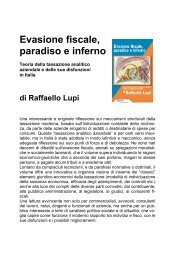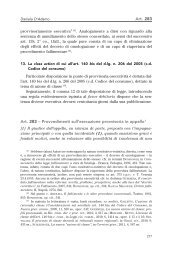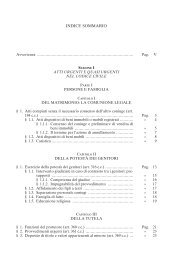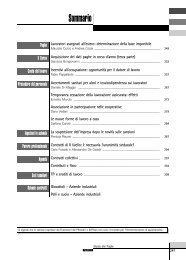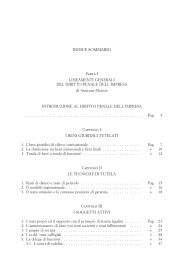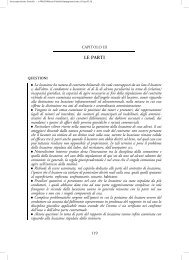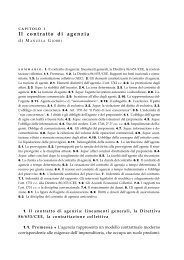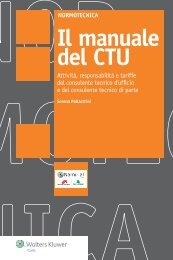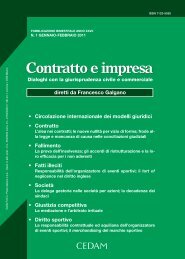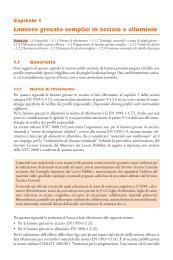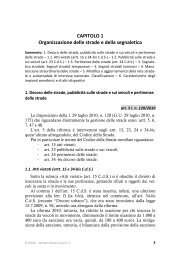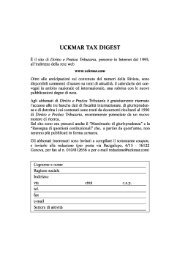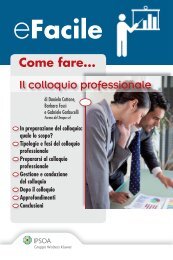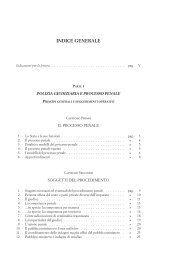- Page 1 and 2:
Nuova Serie - Anno XIV - N. 1 Genna
- Page 3 and 4:
Direttore Alessio Lanzi Comitato di
- Page 5 and 6:
proprietà letteraria riservata ___
- Page 7 and 8:
6 INDICE Vecchie pagine, ricordi e
- Page 9 and 10:
8 L’INDICE PENALE, 1/2011 enti, s
- Page 11 and 12:
10 L’INDICE PENALE, 1/2011 i moti
- Page 13 and 14:
12 L’INDICE PENALE, 1/2011 umana.
- Page 15 and 16:
14 L’INDICE PENALE, 1/2011 dico h
- Page 17 and 18:
16 L’INDICE PENALE, 1/2011 invece
- Page 19 and 20:
18 L’INDICE PENALE, 1/2011 formal
- Page 21 and 22:
20 L’INDICE PENALE, 1/2011 ovvero
- Page 23 and 24:
22 L’INDICE PENALE, 1/2011 nella
- Page 25 and 26:
24 litici e dei legislatori; posto
- Page 27 and 28:
26 Salvo errori, fummo i primi a se
- Page 29 and 30:
28 L’INDICE PENALE, 1/2011 stitut
- Page 31 and 32:
30 L’INDICE PENALE, 1/2011 di Cal
- Page 33 and 34:
32 L’INDICE PENALE, 1/2011 compor
- Page 35 and 36:
34 L’INDICE PENALE, 1/2011 delle
- Page 37 and 38:
36 L’INDICE PENALE, 1/2011 entra
- Page 39 and 40:
38 L’INDICE PENALE, 1/2011 nale
- Page 41 and 42:
40 L’INDICE PENALE, 1/2011 i vari
- Page 43 and 44:
42 L’INDICE PENALE, 1/2011 sulla
- Page 45 and 46:
44 L’INDICE PENALE, 1/2011 zioni
- Page 47 and 48:
46 L’INDICE PENALE, 1/2011 rispon
- Page 49 and 50:
48 L’INDICE PENALE, 1/2011 di req
- Page 51 and 52:
50 L’INDICE PENALE, 1/2011 Gli am
- Page 53 and 54:
52 L’INDICE PENALE, 1/2011 sponde
- Page 55 and 56:
54 L’INDICE PENALE, 1/2011 essere
- Page 57 and 58:
56 L’INDICE PENALE, 1/2011 lazion
- Page 59 and 60:
58 L’INDICE PENALE, 1/2011 in cui
- Page 61 and 62:
60 L’INDICE PENALE, 1/2011 poich
- Page 63 and 64:
62 L’INDICE PENALE, 1/2011 I due
- Page 65 and 66:
64 L’INDICE PENALE, 1/2011 deterr
- Page 67 and 68:
66 ment. In maniera simile, il bene
- Page 69 and 70:
68 L’INDICE PENALE, 1/2011 analiz
- Page 71 and 72:
70 L’INDICE PENALE, 1/2011 qua no
- Page 73 and 74:
72 L’INDICE PENALE, 1/2011 ad acc
- Page 75 and 76:
74 L’INDICE PENALE, 1/2011 progre
- Page 77 and 78:
76 di imputare un evento sulla base
- Page 79 and 80:
78 L’INDICE PENALE, 1/2011 sono r
- Page 81 and 82:
80 L’INDICE PENALE, 1/2011 tiche
- Page 83 and 84:
82 L’INDICE PENALE, 1/2011 reati
- Page 85 and 86:
84 L’INDICE PENALE, 1/2011 logica
- Page 87 and 88:
86 L’INDICE PENALE, 1/2011 mini p
- Page 89 and 90:
88 L’INDICE PENALE, 1/2011 tizzaz
- Page 91 and 92:
90 L’INDICE PENALE, 1/2011 La ste
- Page 93 and 94:
92 L’INDICE PENALE, 1/2011 mittel
- Page 95 and 96:
94 L’INDICE PENALE, 1/2011 critic
- Page 97 and 98:
96 L’INDICE PENALE, 1/2011 perch
- Page 99 and 100:
98 L’INDICE PENALE, 1/2011 ribadi
- Page 101 and 102:
100 L’INDICE PENALE, 1/2011 in ne
- Page 103 and 104:
102 L’INDICE PENALE, 1/2011 vento
- Page 105 and 106:
104 L’INDICE PENALE, 1/2011 una f
- Page 107 and 108:
106 L’INDICE PENALE, 1/2011 a seg
- Page 109 and 110:
108 L’INDICE PENALE, 1/2011 alle
- Page 111 and 112:
110 L’INDICE PENALE, 1/2011 stenz
- Page 113 and 114:
112 L’INDICE PENALE, 1/2011 suffi
- Page 115 and 116:
114 L’INDICE PENALE, 1/2011 La pr
- Page 117 and 118:
116 L’INDICE PENALE, 1/2011 4. I
- Page 119 and 120:
118 L’INDICE PENALE, 1/2011 compi
- Page 121 and 122:
120 L’INDICE PENALE, 1/2011 sciut
- Page 123 and 124:
122 L’INDICE PENALE, 1/2011 certo
- Page 126 and 127:
LA RILEVANZA PENALE DELLA SPERIMENT
- Page 128 and 129:
STUDI E RASSEGNE 127 Se si intendes
- Page 130 and 131:
STUDI E RASSEGNE 129 contrapposto,
- Page 132 and 133:
STUDI E RASSEGNE 131 cui si incentr
- Page 134 and 135:
STUDI E RASSEGNE 133 scuno dei due
- Page 136 and 137:
STUDI E RASSEGNE 135 della legge n.
- Page 138 and 139:
STUDI E RASSEGNE 137 coinvolti nell
- Page 140 and 141:
STUDI E RASSEGNE 139 A maggior ragi
- Page 142 and 143:
STUDI E RASSEGNE 141 Per effettuare
- Page 144 and 145:
STUDI E RASSEGNE 143 La questione r
- Page 146 and 147:
STUDI E RASSEGNE 145 via della care
- Page 148 and 149:
STUDI E RASSEGNE 147 Sebbene sia au
- Page 150 and 151:
STUDI E RASSEGNE 149 prevedeva il d
- Page 152 and 153:
STUDI E RASSEGNE 151 gida nei confr
- Page 154 and 155:
STUDI E RASSEGNE 153 a una sperimen
- Page 156 and 157:
STUDI E RASSEGNE 155 della peculiar
- Page 158 and 159:
STUDI E RASSEGNE 157 La questione d
- Page 160 and 161:
STUDI E RASSEGNE 159 cellule stamin
- Page 162 and 163:
STUDI E RASSEGNE 161 di disposizion
- Page 164 and 165:
STUDI E RASSEGNE 163 12, comma 2, c
- Page 166:
STUDI E RASSEGNE 165 da quei gruppi
- Page 169 and 170:
168 L’INDICE PENALE, 1/2011 per i
- Page 171 and 172:
170 L’INDICE PENALE, 1/2011 bito
- Page 173 and 174:
172 L’INDICE PENALE, 1/2011 2. L
- Page 175 and 176:
174 L’INDICE PENALE, 1/2011 eredi
- Page 177 and 178:
176 L’INDICE PENALE, 1/2011 sione
- Page 179 and 180:
178 L’INDICE PENALE, 1/2011 deve
- Page 181 and 182:
180 L’INDICE PENALE, 1/2011 tembr
- Page 183 and 184:
182 L’INDICE PENALE, 1/2011 rare
- Page 185 and 186:
184 L’INDICE PENALE, 1/2011 cità
- Page 187 and 188:
186 L’INDICE PENALE, 1/2011 genza
- Page 189 and 190:
188 L’INDICE PENALE, 1/2011 nimo
- Page 191 and 192:
190 L’INDICE PENALE, 1/2011 auton
- Page 193 and 194:
192 L’INDICE PENALE, 1/2011 roga
- Page 195 and 196:
194 L’INDICE PENALE, 1/2011 gener
- Page 197 and 198:
196 L’INDICE PENALE, 1/2011 pena
- Page 199 and 200:
198 L’INDICE PENALE, 1/2011 spett
- Page 201 and 202:
200 L’INDICE PENALE, 1/2011 Con l
- Page 203 and 204:
202 L’INDICE PENALE, 1/2011 simbo
- Page 205 and 206:
204 L’INDICE PENALE, 1/2011 media
- Page 207 and 208:
206 L’INDICE PENALE, 1/2011 tive(
- Page 209 and 210:
208 L’INDICE PENALE, 1/2011 L’u
- Page 211 and 212:
210 L’INDICE PENALE, 1/2011 minim
- Page 213 and 214:
212 L’INDICE PENALE, 1/2011 231/2
- Page 215 and 216:
214 L’INDICE PENALE, 1/2011 Quant
- Page 217 and 218:
216 L’INDICE PENALE, 1/2011 solo
- Page 220 and 221:
GIURISPRUDENZA COMMENTATA 219 Giuri
- Page 222 and 223:
GIURISPRUDENZA COMMENTATA 221 «Mal
- Page 224 and 225:
GIURISPRUDENZA COMMENTATA 223 Lo sb
- Page 226 and 227:
GIURISPRUDENZA COMMENTATA 225 ricon
- Page 228 and 229: GIURISPRUDENZA COMMENTATA 227 tolog
- Page 230 and 231: GIURISPRUDENZA COMMENTATA 229 Senza
- Page 232 and 233: GIURISPRUDENZA COMMENTATA 231 cune)
- Page 234 and 235: GIURISPRUDENZA COMMENTATA 233 posta
- Page 236 and 237: GIURISPRUDENZA COMMENTATA 235 geome
- Page 238 and 239: Cassazione, sez. I penale, n. 2489,
- Page 240 and 241: GIURISPRUDENZA COMMENTATA 239 stenu
- Page 242 and 243: GIURISPRUDENZA COMMENTATA 241 Il pu
- Page 244 and 245: GIURISPRUDENZA COMMENTATA 243 rigor
- Page 246 and 247: GIURISPRUDENZA COMMENTATA 245 tale
- Page 248 and 249: GIURISPRUDENZA COMMENTATA 247 speci
- Page 250 and 251: GIURISPRUDENZA COMMENTATA 249 dendo
- Page 252 and 253: GIURISPRUDENZA COMMENTATA 251 Corte
- Page 254 and 255: 253 Diritto penale straniero, compa
- Page 256 and 257: DIRITTO PENALE STRANIERO, COMPARATO
- Page 258 and 259: DIRITTO PENALE STRANIERO, COMPARATO
- Page 260 and 261: DIRITTO PENALE STRANIERO, COMPARATO
- Page 262 and 263: DIRITTO PENALE STRANIERO, COMPARATO
- Page 264 and 265: DIRITTO PENALE STRANIERO, COMPARATO
- Page 266 and 267: DIRITTO PENALE STRANIERO, COMPARATO
- Page 268 and 269: DIRITTO PENALE STRANIERO, COMPARATO
- Page 270 and 271: DIRITTO PENALE STRANIERO, COMPARATO
- Page 272 and 273: DIRITTO PENALE STRANIERO, COMPARATO
- Page 274 and 275: DIRITTO PENALE STRANIERO, COMPARATO
- Page 276 and 277: DIRITTO PENALE STRANIERO, COMPARATO
- Page 280 and 281: DIRITTO PENALE STRANIERO, COMPARATO
- Page 282 and 283: DIRITTO PENALE STRANIERO, COMPARATO
- Page 284 and 285: DIRITTO PENALE STRANIERO, COMPARATO
- Page 286 and 287: DIRITTO PENALE STRANIERO, COMPARATO
- Page 288 and 289: DIRITTO PENALE STRANIERO, COMPARATO
- Page 290 and 291: DIRITTO PENALE STRANIERO, COMPARATO
- Page 292 and 293: DIRITTO PENALE STRANIERO, COMPARATO
- Page 294 and 295: DIRITTO PENALE STRANIERO, COMPARATO
- Page 296 and 297: DIRITTO PENALE STRANIERO, COMPARATO
- Page 298 and 299: DIRITTO PENALE STRANIERO, COMPARATO
- Page 300 and 301: DIRITTO PENALE STRANIERO, COMPARATO
- Page 302 and 303: DIRITTO PENALE STRANIERO, COMPARATO
- Page 304 and 305: DIRITTO PENALE STRANIERO, COMPARATO
- Page 306 and 307: DIRITTO PENALE STRANIERO, COMPARATO
- Page 308 and 309: DIRITTO PENALE STRANIERO, COMPARATO
- Page 310 and 311: DIRITTO PENALE STRANIERO, COMPARATO
- Page 312 and 313: DIRITTO PENALE STRANIERO, COMPARATO
- Page 314 and 315: DIRITTO PENALE STRANIERO, COMPARATO
- Page 316 and 317: DIRITTO PENALE STRANIERO, COMPARATO
- Page 318 and 319: DIRITTO PENALE STRANIERO, COMPARATO
- Page 320 and 321: DIRITTO PENALE STRANIERO, COMPARATO
- Page 322 and 323: DIRITTO PENALE STRANIERO, COMPARATO
- Page 324 and 325: DIRITTO PENALE STRANIERO, COMPARATO
- Page 326 and 327: DIRITTO PENALE STRANIERO, COMPARATO
- Page 328 and 329:
DIRITTO PENALE STRANIERO, COMPARATO
- Page 330 and 331:
329 essendo riconducibili ad una no
- Page 332 and 333:
DIRITTO PENALE STRANIERO, COMPARATO
- Page 334 and 335:
DIRITTO PENALE STRANIERO, COMPARATO
- Page 336 and 337:
DIRITTO PENALE STRANIERO, COMPARATO
- Page 338 and 339:
DIRITTO PENALE STRANIERO, COMPARATO
- Page 340 and 341:
DIRITTO PENALE STRANIERO, COMPARATO
- Page 342 and 343:
DIRITTO PENALE STRANIERO, COMPARATO
- Page 344 and 345:
DIRITTO PENALE STRANIERO, COMPARATO
- Page 346 and 347:
8. L’autorìa mediata. DIRITTO PE
- Page 348 and 349:
DIRITTO PENALE STRANIERO, COMPARATO
- Page 350 and 351:
DIRITTO PENALE STRANIERO, COMPARATO
- Page 352 and 353:
DIRITTO PENALE STRANIERO, COMPARATO
- Page 354 and 355:
DIRITTO PENALE STRANIERO, COMPARATO
- Page 356 and 357:
DIRITTO PENALE STRANIERO, COMPARATO
- Page 358 and 359:
DIRITTO PENALE STRANIERO, COMPARATO
- Page 360 and 361:
DIRITTO PENALE STRANIERO, COMPARATO
- Page 362 and 363:
DIRITTO PENALE STRANIERO, COMPARATO
- Page 364 and 365:
DIRITTO PENALE STRANIERO, COMPARATO
- Page 366 and 367:
DIRITTO PENALE STRANIERO, COMPARATO
- Page 368 and 369:
DIRITTO PENALE STRANIERO, COMPARATO
- Page 370 and 371:
DIRITTO PENALE STRANIERO, COMPARATO
- Page 372 and 373:
DIRITTO PENALE STRANIERO, COMPARATO
- Page 374 and 375:
DIRITTO PENALE STRANIERO, COMPARATO
- Page 376 and 377:
375 mini nell’ambito dell’impre
- Page 378 and 379:
DIRITTO PENALE STRANIERO, COMPARATO
- Page 380 and 381:
DIRITTO PENALE STRANIERO, COMPARATO
- Page 382:
DIRITTO PENALE STRANIERO, COMPARATO
- Page 385 and 386:
384 L’INDICE PENALE, 1/2011 sullo
- Page 387 and 388:
386 L’INDICE PENALE, 1/2011 biano
- Page 389 and 390:
388 L’INDICE PENALE, 1/2011 al di
- Page 391 and 392:
390 L’INDICE PENALE, 1/2011 Germa
- Page 393 and 394:
392 L’INDICE PENALE, 1/2011 e che
- Page 395 and 396:
394 L’INDICE PENALE, 1/2011 nativ
- Page 397 and 398:
396 L’INDICE PENALE, 1/2011 prote
- Page 399 and 400:
398 costituzionalistico sviluppato
- Page 401 and 402:
400 L’INDICE PENALE, 1/2011 umani
- Page 403 and 404:
402 L’INDICE PENALE, 1/2011 tina,
- Page 405 and 406:
404 L’INDICE PENALE, 1/2011 diffu
- Page 407 and 408:
406 L’INDICE PENALE, 1/2011 tropp
- Page 409 and 410:
408 demico’’ tra il mondo svilu
- Page 411 and 412:
410 L’INDICE PENALE, 1/2011 che,
- Page 413 and 414:
412 L’INDICE PENALE, 1/2011 Tipo
- Page 415 and 416:
414 L’INDICE PENALE, 1/2011 la no
- Page 417 and 418:
416 L’INDICE PENALE, 1/2011 prote
- Page 419 and 420:
418 L’INDICE PENALE, 1/2011 quant
- Page 421 and 422:
420 L’INDICE PENALE, 1/2011 perme
- Page 423 and 424:
422 L’INDICE PENALE, 1/2011 se la
- Page 425 and 426:
424 L’INDICE PENALE, 1/2011 trina
- Page 427 and 428:
426 L’INDICE PENALE, 1/2011 colom
- Page 429 and 430:
428 L’INDICE PENALE, 1/2011 al ti
- Page 431 and 432:
430 L’INDICE PENALE, 1/2011 accer
- Page 433 and 434:
432 L’INDICE PENALE, 1/2011 lità
- Page 435 and 436:
434 L’INDICE PENALE, 1/2011 damen
- Page 437 and 438:
436 parte, l’importante margine d
- Page 439 and 440:
438 L’INDICE PENALE, 1/2011 colt
- Page 441 and 442:
440 L’INDICE PENALE, 1/2011 si è
- Page 443 and 444:
442 L’INDICE PENALE, 1/2011 dottr
- Page 445 and 446:
444 L’INDICE PENALE, 1/2011 tica
- Page 447 and 448:
446 L’INDICE PENALE, 1/2011 zioni
- Page 449 and 450:
448 L’INDICE PENALE, 1/2011 nel d
- Page 451 and 452:
450 L’INDICE PENALE, 1/2011 ricon
- Page 453 and 454:
452 L’INDICE PENALE, 1/2011 del B
- Page 455 and 456:
454 L’INDICE PENALE, 1/2011 genza
- Page 457 and 458:
456 L’INDICE PENALE, 1/2011 conte
- Page 459 and 460:
458 L’INDICE PENALE, 1/2011 La pr
- Page 461 and 462:
460 L’INDICE PENALE, 1/2011 appen
- Page 463 and 464:
462 L’INDICE PENALE, 1/2011 Nel n
- Page 465 and 466:
464 L’INDICE PENALE, 1/2011 sessu
- Page 467 and 468:
466 L’INDICE PENALE, 1/2011 obiet
- Page 469 and 470:
468 L’INDICE PENALE, 1/2011 esser
- Page 471 and 472:
470 L’INDICE PENALE, 1/2011 coatt
- Page 473 and 474:
472 L’INDICE PENALE, 1/2011 sull
- Page 475 and 476:
474 L’INDICE PENALE, 1/2011 in ma
- Page 477 and 478:
476 L’INDICE PENALE, 1/2011 stess
- Page 479 and 480:
478 L’INDICE PENALE, 1/2011 delle
- Page 481 and 482:
480 L’INDICE PENALE, 1/2011 profi
- Page 483 and 484:
482 L’INDICE PENALE, 1/2011 relat
- Page 485 and 486:
484 L’INDICE PENALE, 1/2011 con
- Page 487 and 488:
486 L’INDICE PENALE, 1/2011 gerer
- Page 489 and 490:
488 L’INDICE PENALE, 1/2011 Inser
- Page 491 and 492:
490 L’INDICE PENALE, 1/2011 senti
- Page 493 and 494:
492 L’INDICE PENALE, 1/2011 gnano
- Page 495 and 496:
494 L’INDICE PENALE, 1/2011 ‘
- Page 498 and 499:
ANCORA SU TERRORISMO E STATO DELLA
- Page 500 and 501:
DIRITTO PENALE STRANIERO, COMPARATO
- Page 502 and 503:
DIRITTO PENALE STRANIERO, COMPARATO
- Page 504 and 505:
DIRITTO PENALE STRANIERO, COMPARATO
- Page 506 and 507:
DIRITTO PENALE STRANIERO, COMPARATO
- Page 508 and 509:
DIRITTO PENALE STRANIERO, COMPARATO
- Page 510 and 511:
DIRITTO PENALE STRANIERO, COMPARATO
- Page 512 and 513:
DIRITTO PENALE STRANIERO, COMPARATO
- Page 514 and 515:
DIRITTO PENALE STRANIERO, COMPARATO
- Page 516 and 517:
DIRITTO PENALE STRANIERO, COMPARATO
- Page 518 and 519:
DIRITTO PENALE STRANIERO, COMPARATO
- Page 520:
DIRITTO PENALE STRANIERO, COMPARATO
- Page 523 and 524:
522 L’INDICE PENALE, 1/2011 deter
- Page 525 and 526:
524 L’INDICE PENALE, 1/2011 il va
- Page 527 and 528:
526 L’INDICE PENALE, 1/2011 una e
- Page 529 and 530:
528 L’INDICE PENALE, 1/2011 ma un
- Page 531 and 532:
530 L’INDICE PENALE, 1/2011 per i
- Page 533 and 534:
532 L’INDICE PENALE, 1/2011 lità
- Page 535 and 536:
534 L’INDICE PENALE, 1/2011 si ri
- Page 537 and 538:
536 L’INDICE PENALE, 1/2011 mità
- Page 539 and 540:
538 L’INDICE PENALE, 1/2011 sulte
- Page 541 and 542:
540 L’INDICE PENALE, 1/2011 ‘
- Page 543 and 544:
542 L’INDICE PENALE, 1/2011 Altro
- Page 545 and 546:
544 L’INDICE PENALE, 1/2011 Evide
- Page 547 and 548:
546 L’INDICE PENALE, 1/2011 Breve
- Page 549 and 550:
548 L’INDICE PENALE, 1/2011 plina
- Page 551 and 552:
550 L’INDICE PENALE, 1/2011 sione
- Page 553 and 554:
552 L’INDICE PENALE, 1/2011 ricet
- Page 555 and 556:
554 L’INDICE PENALE, 1/2011 In de
- Page 557 and 558:
556 L’INDICE PENALE, 1/2011 lizia
- Page 559 and 560:
558 L’INDICE PENALE, 1/2011 pur r
- Page 561 and 562:
560 L’INDICE PENALE, 1/2011 fusa
- Page 563 and 564:
562 L’INDICE PENALE, 1/2011 scend
- Page 565 and 566:
564 L’INDICE PENALE, 1/2011 sale
- Page 567 and 568:
566 L’INDICE PENALE, 1/2011 che a
- Page 569 and 570:
568 L’INDICE PENALE, 1/2011 ingiu
- Page 571 and 572:
570 L’INDICE PENALE, 1/2011 la ri
- Page 573 and 574:
572 L’INDICE PENALE, 1/2011 lavor
- Page 575 and 576:
574 L’INDICE PENALE, 1/2011 giato
- Page 577 and 578:
576 L’INDICE PENALE, 1/2011 9. Il
- Page 579 and 580:
578 L’INDICE PENALE, 1/2011 strum
- Page 581 and 582:
580 L’INDICE PENALE, 1/2011 voro,
- Page 583 and 584:
582 L’INDICE PENALE, 1/2011 con g
- Page 585 and 586:
584 L’INDICE PENALE, 1/2011 costa
- Page 587 and 588:
586 L’INDICE PENALE, 1/2011 proch
- Page 589 and 590:
588 L’INDICE PENALE, 1/2011 solo
- Page 591 and 592:
590 L’INDICE PENALE, 1/2011 e div
- Page 593 and 594:
592 L’INDICE PENALE, 1/2011 anzi,
- Page 595 and 596:
594 L’INDICE PENALE, 1/2011 quale
- Page 597 and 598:
596 L’INDICE PENALE, 1/2011 diseg
- Page 599 and 600:
598 L’INDICE PENALE, 1/2011 sogge
- Page 601 and 602:
600 L’INDICE PENALE, 1/2011 Fra g
- Page 603 and 604:
602 L’INDICE PENALE, 1/2011 - su



